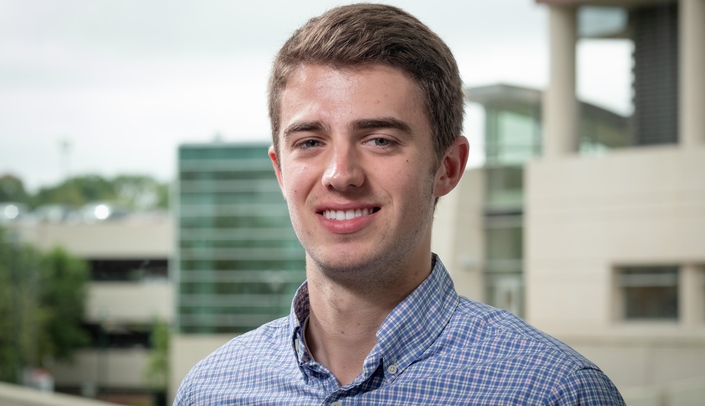On May 28, the Nebraska Institutional Development Award Program (IDeA) Networks of Biomedical Research Excellence (INBRE) program welcomed 29 undergraduate students from across Nebraska as they embark on their summer research experience at Creighton University, the University of Nebraska-Lincoln and the University of Nebraska Medical Center.
The INBRE program is overseen by Paul Sorgen, Ph.D., a professor in the department of biochemistry and molecular biology at UNMC and principal investigator of the $16.2 million National Institutes of Health grant that supports the program.
Established in 2001, the INBRE program was created to expose students to serious biomedical research, build a statewide biomedical research infrastructure between undergraduate and graduate institutions and to strengthen undergraduate institution's infrastructure and increase its capacity to conduct cutting-edge biomedical and behavioral research.
The students, referred to as INBRE scholars, enter the program after completing their sophomore year of college upon recommendation by their college professors. The students receive a two-year scholarship and spend 10 weeks each summer conducting research on either their home campus or at UNMC, the University of Nebraska-Lincoln or Creighton University.
At the end of the summer, the students attend the INBRE annual meeting where they give an oral presentation on their research project.
Below Diego Gomez, a neuroscience major at Creighton University, talks about his INBRE experience.
What should we know about you?
“I was actually born and raised in Spain, but my family is from the Midwest. Even though school takes up a lot of my time, I enjoy spending time outdoors and going on hikes. I also have been playing the piano for over 10 years, and love to hang out at coffee shops.”
What or who influenced your interest in science?
“I was initially interested in the sciences after taking a couple of chemistry classes in high school. I chose to continue studying science in college, which further confirmed my interest in pursuing a career in this area. Having the opportunity to do research in Biochemistry at Creighton as well as in Fetal Alcohol Spectrum Disorders (FASD) at UNMC have corroborated my desire to progress in the field of investigative science.”
What is it about science that excites you?
“What is most exciting about science is the idea that I can have a global impact from a small lab bench. The process of asking a question and diving into a project in order to attempt to answer it is very exciting. I have been lucky enough to be able to publish some of my work, which is very rewarding.”
Will you pursue a career in science? If so, what do you hope to accomplish?
“I hope to pursue an MD/Ph.D. and dedicate part of my time to doing clinical research.”
Why is it important to have programs like INBRE?
“The INBRE program has allowed me to secure a research position for my last two years of undergraduate school at Creighton. Since it provides a stipend, I am able to spend more time in the lab instead of taking on an additional job. The INBRE program holds weekly seminars in which I get to learn about new topics and interact with different scientists from institutions across the country.”
We are Nebraska Medicine and UNMC. Our mission is to lead the world in transforming lives to create a healthy future for all individuals and communities through premier educational programs, innovative research and extraordinary patient care.
Twitter | Facebook | Instagram | YouTube | Flickr
